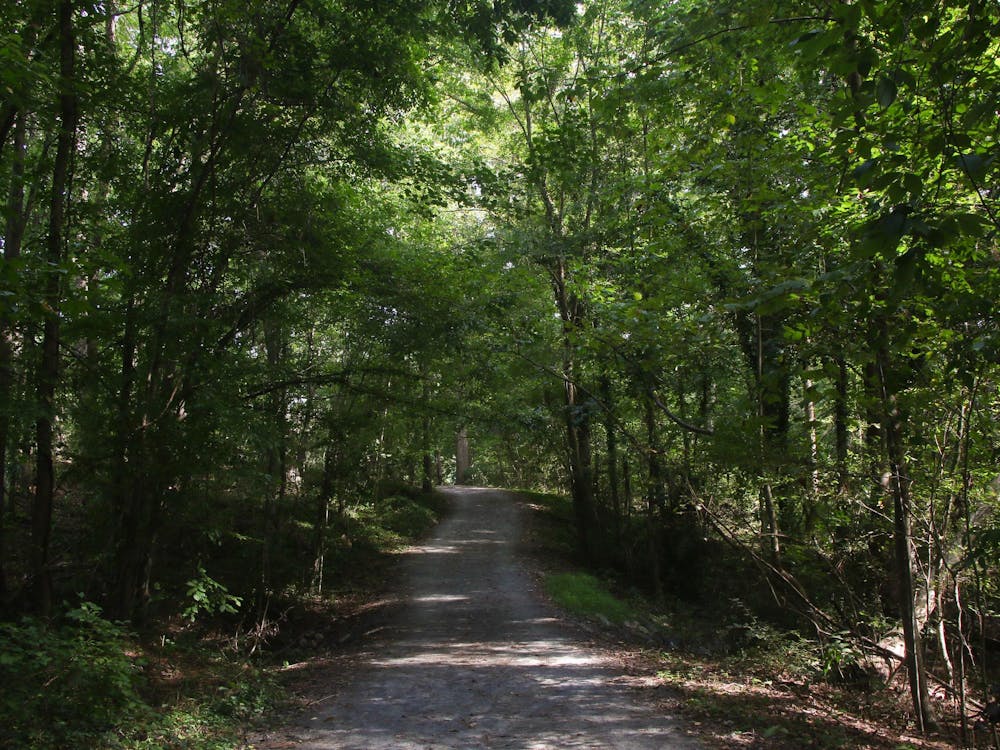For the 17th time, sectors of the Duke Forest will close for deer hunting as part of the annual deer herd reduction program.
Beginning Monday and concluding Dec. 13, the Durham, Korstian and Blackwood Divisions of the forest will be closed to the public on weekdays to prevent injury during the hunting period. Only permitted bow-and-arrow hunters will be allowed entry as they attempt to reduce the white-tailed deer population and maintain the forest’s health.
The program aims “to essentially protect the Duke Forest as a teaching and research laboratory,” according to Lori Bennear, interim dean of the Nicholas School of the Environment and chair of the Duke Forest Advisory Committee.
The Duke Forest, made up of over 7,000 acres of forested land and open fields, has been used by the University for teaching and research since 1931. In turn, the University assists with wildlife management “by restricting human disturbance in certain habitats, targeting reduction of overabundant white-tailed deer and managing for a diversity of habitats at the landscape and stand levels.”
The white-tailed deer population in the United States has vastly increased in recent decades, largely due to human elimination of many predators like wolves, cougars and coyotes.
In 2020, the N.C. Wildlife Resources Commission estimated deer densities in Durham and Orange Counties — where the Duke Forest is located — at 41 to 50 and over 50 deer per square mile, respectively. The generally accepted carrying capacity for deer in the region is eight to 26 deer per square mile.
“The forest’s natural regrowth ecosystem can be damaged permanently because there's too much consumption of the undergrowth,” Bennear said.
In addition to harming the natural environment, an abundance of deer leads to “fighting for scarce resources” and makes it “harder and harder for the deer to survive,” according to Bennear. Overly high deer populations can also lead to the spread of zoonotic diseases and property damage averaging $73 per household.
The general public cannot hunt as part of the program, which partners annually with the North Carolina Bowhunters Association and the North Carolina Wildlife Resources Commission.
Bowhunters come from a pre-selected group and must participate in mandatory orientation sessions, assist with data collection and coordinate with Duke Forest officials. Poaching evidence will be formally reported to N.C. Wildlife Investigations personnel.
Safety is paramount for organizers of the program, which is why only bow-and-arrow hunting is permitted. “We don't want guns in the forest,” Bennear said.
Moreover, signs will be placed at all gated entrances to the forest informing visitors of the closure, and unauthorized visitors will receive a citation from Duke Forest staff.
Despite the program’s benefits, the forest closure also has some drawbacks, particularly for recreation.
“During the weeks when this program is in effect, you can't just go for a hike in that part of the Duke Forest, and that's an opportunity cost,” Bennear said.
While Bennear indicated that there have been discussions regarding whether it would be possible to close the forest only on certain days instead of Monday through Friday, this proposal also raises issues.
Bennear explained that the selected hunters are “not super local” and prefer “the flexibility to be able to do this during the week.” Additionally, she noted that closing the forest on some days but not others could confuse visitors and lead to accidental injury.
Following the program, there will be a Spotlight Survey in the spring conducted by Duke Forest staff and student volunteers who “utilize high-powered flashlights (or spotlights) to look for deer and count each individual observed across five standardized routes.” The data is then used to measure deer abundance and distribution.
The forest will still be open on weekends, and classes and research activities in the Duke Forest will continue, though faculty are required to register their event with the Duke Forest office to ensure that hunters maintain their distance. The Al Buehler Cross Country Trail and East Campus Trail will remain open during the week, though the recreational areas are not part of the Duke Forest.
Editor's note: This story was updated Friday morning to note that the Al Buehler Cross Country Trail and East Campus Trail are not part of the Duke Forest.
Get The Chronicle straight to your inbox
Sign up for our weekly newsletter. Cancel at any time.
Dylan Halper is a Trinity first-year and a staff reporter for the news department.

